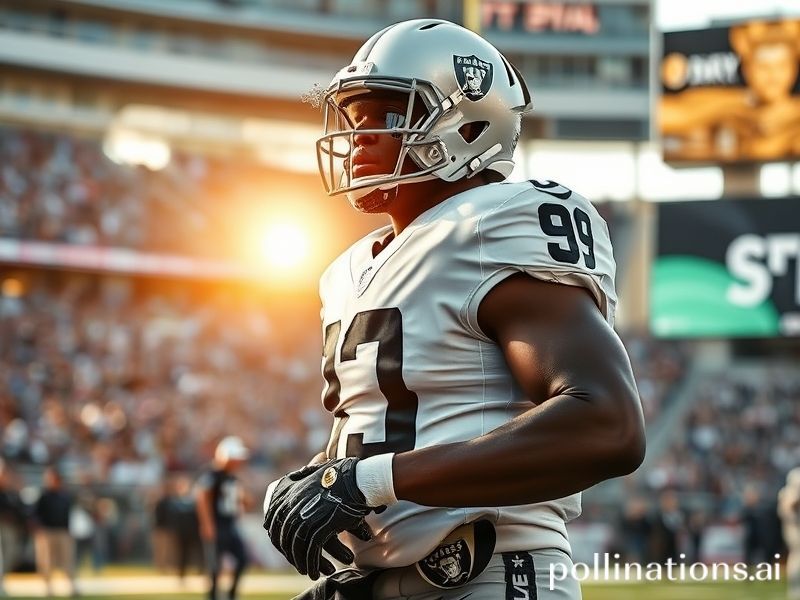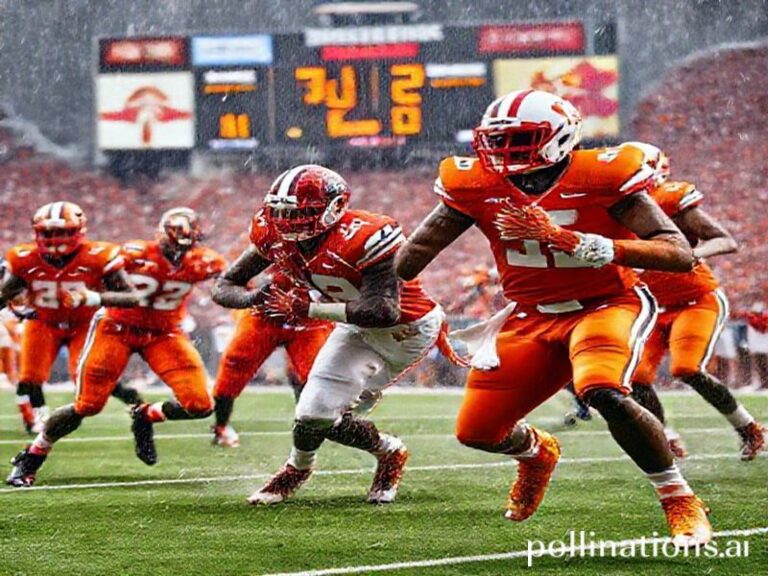Clelin Ferrell: The Global Trade Route of an NFL Draft Bust
Clelin Ferrell and the Merciless Geography of Athletic Fame
By Our Man in the Cheap Seats, Somewhere Over the Mid-Atlantic
Somewhere between the 38th parallel and the 49-yard line, Clelin Ferrell’s name still echoes—mostly in the form of incredulous laughter from Raiders fans who once believed the 2019 draft was their deliverance from perpetual mediocrity. But let’s zoom out, dear reader, because Ferrell’s story is less about a defensive end and more about the international supply chain of broken dreams.
In Kinshasa, street kids who’ve never seen a regulation football can still tell you the going rate for a sack in the NFL: roughly one new pair of knock-off Yeezys shipped via Guangzhou and re-exported by a cousin in Antwerp. In Jakarta, a bootleg jersey bearing Ferrell’s name sells for the price of two nasi goreng dinners—proof that even unmet expectations travel well. The global south has always excelled at recycling the north’s disappointments; ask any Ghanaian scrap-yard where busted combine harvesters go to die, and you’ll find the same entrepreneurial zeal that keeps Ferrell’s No. 96 stitched onto polyester in a Lagos night market.
What makes Ferrell particularly useful to the world’s cynics is that he embodies the modern parable of misallocated hope. The Raiders—an American brand now flirting with Las Vegas the way European soccer clubs flirt with Doha—took him fourth overall, ahead of Josh Allen, ahead of common sense. Instantly, he became a transatlantic metaphor: the expensive draft pick as unsecured sovereign debt. European Central Bankers nodded sympathetically; they too once thought Greece would grow 4% forever.
Three continents away, Japanese baseball scouts watched Ferrell’s underwhelming rookie film and felt a pang of recognition. They’d seen the same arc with “can’t-miss” high-school pitchers whose elbows dissolved faster than a yen carry trade. The lesson crosses borders: when you overpay for potential, you underwrite heartbreak. Moody’s should issue a credit rating on every first-round pick; Ferrell would be somewhere between Bolivian highway bonds and a suburban mall in Ohio.
And yet, the man himself persists. Cut by the Raiders, shuffled to the 49ers practice squad, then rescued by Washington’s Commanders—an organization that sounds like a Bond villain’s shell company. Ferrell’s passport now has more NFC East stamps than a congressional junket. He’s the Willy Loman of edge rushers, forever lugging his sample case of spin moves to the next front office that feigns interest over Zoom from Dubai.
The broader significance? Ferrell illustrates how globalization sells illusions in bulk. The same fiber-optic cables that transmit Ukrainian battlefield footage also carry Mel Kiper’s hair-gelled hyperbole to a bar in Nairobi where patrons debate whether Ferrell’s first-step quickness could be fixed by switching to ugali. We are all plugged into the same disappointment IV drip, just with different voltage adapters.
Meanwhile, the sports-industrial complex keeps humming like a Bangladeshi textile mill in monsoon season. Broadcast rights, fantasy leagues, crypto-sponsored scoreboards—every pixel monetized, every underperforming athlete a teachable moment in portfolio diversification. Ferrell’s cap hit is now somebody else’s tax write-off; his missed tackles are gifs on a Finnish teenager’s burner account. In the great ledger of late capitalism, he is both line item and cautionary tale.
And still, somewhere tonight, a kid in Caracas is streaming grainy YouTube highlights of Ferrell’s Clemson days, convinced that tomorrow’s workout will unlock the same burst. Hope, unlike pass-rush win rate, remains undefeated across borders.
Conclusion: Clelin Ferrell’s career is a reminder that the world runs on hype futures, traded 24/7 with no circuit breakers. From Sacramento to Sarajevo, we keep buying the dream at a premium and selling the reality at a loss. And when the final whistle blows, only the accountants and the jersey counterfeiters will be left standing—both fluent in the universal language of depreciation.







